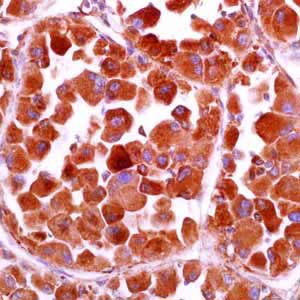
Cathepsin K (3F9)

Cathepsin K is a lysosomal papain-like cystine proteinase and can be expressed in normal osteoblasts, fibroblasts, and skin.1 Recently, cathepsin K has been reported as useful in distinguishing translocation renal cell carcinoma (RCC) from other subtypes of RCC.1 Mortignoni et al. tested 17 cases of translocation RCC and found that cathepsin K stained 6 of 8 cases of translocation RCC with t(X;1), all seven cases of translocation RCC with t(6;11), but was negative for one case with t(X;3) and one with t(X;17).1 Additionally, the study compared IHC detection of TFE3 antibody in the 17 cases and demonstrated that all translocation RCC with t(6;11) were completely negative for TFE3, but positive for cathepsin K; all other translocation RCC with different chromosomal translocations other than t(X;1) expressed TFE3.1 Thus, it is recommended that antibodies against both TFE3 and cathepsin K should be used for evaluating translocation renal cell carcinomas.1 None of the 305 other renal cell neoplasms representing the most common renal cell neoplasm subtypes were positive for cathepsin K.1 Zheng et al. reported only 2.7% of 1,140 carcinomas from various organs exhibited cathepsin K labeling, indicating that among carcinomas cathepsin K labeling is highly specific for translocation RCC and can be used to help differentiate translocation RCC from other carcinomas.2
